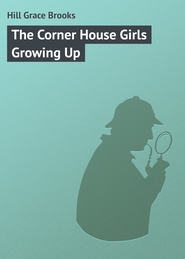По всем вопросам обращайтесь на: info@litportal.ru
(©) 2003-2024.
✖
The Corner House Girls Snowbound
Настройки чтения
Размер шрифта
Высота строк
Поля
“Perhaps that is why they have run away,” said Ruth, smiling. “Rodgers sounds to me – from his telegram – as though he had one awful lack.”
“You frighten me. What lack?”
“Lack of a sense of humor. And that is fatal in the character of anybody who has a pair of twins on his hands.”
Mr. Howbridge threw up his own hands in amazement. “I must lack that myself,” he said. “I see nothing funny, at least, in the idea of having Ralph and Rowena Birdsall in my house.”
“It helps,” said Ruth. “A sense of humor is what has kept me going all these years,” she added demurely. “If you think a pair of twins can be compared to Tess and Dot and Sammy Pinkney – to say nothing of Aggie and Neale – ”
“Oh! Oh!” shouted the two latter in chorus.
“You have a mean mind, Ruthie Kenway,” declared the blonde beauty.
“I knew I wasn’t much liked,” admitted Neale O’Neil. “But that is the unkindest cut of all.”
“You have had experience, I grant you,” said Mr. Howbridge, about to take his departure. “But I foresee much trouble in the case of these Birdsall twins.”
And he was a true prophet there. The twins had utterly disappeared. The Arlington police – indeed, all the county officers together – could find no trace of the orphaned brother and sister.
Mr. Howbridge put private detectives on the case. The twins seemed to have disappeared as utterly as though they really were under the two feet of ice on Arlington Pond.
The lawyer searched personally, advertised in the newspapers, and even offered a reward for the apprehension of the children. A fortnight passed without success.
The governess, Miss Mason, was discharged, for it seemed unnecessary to pay her salary when there were no children for her to teach. Rodgers and his wife could give no aid in the search. They were rather relieved, if the truth were told, to be free of the twins.
“Master Ralph was hard enough to get along with,” the ex-butler admitted. “But Miss Rowena was worse. They wanted to go back into their own house to live. They could not understand why it was shut up, sir,” and the old serving man shook his head.
“They seemed to have taken a dislike to you, sir,” he added to Mr. Howbridge. “They said you ‘hadn’t any right to boss.’ That is the way they put it.”
“But I never even saw them,” returned the lawyer. “I didn’t try ‘to boss’ them.”
“Well, you know, sir,” Rodgers explained, “I had to give ’em reasons for things. You have to with children like Master Ralph and Miss Rowena. So I had to tell ’em you said they were to do this and that.”
“Oh! Ah! I see!” muttered the guardian.
He began to believe that perhaps Ruth Kenway was right. He should have taken more of a personal interest in Ralph and Rowena. They had evidently gained from the ex-butler an entirely wrong impression of what a guardian was.
But the disappearance of the Birdsall twins did not make any change in the plans for the mid-winter visit to Red Deer Lodge. Mr. Howbridge had to go there in any case, and he would not disappoint the Kenways and their friends.
As it chanced, full three weeks were given the Milton schools at the Christmas Holiday time. There were repairs to make in the heating arrangements of both high and grammar school buildings. The schools would close the week before Christmas and not open again until the week following New Year’s Day.
If Sammy Pinkney had had his way, the schools would never have opened again!
“I don’t see what they have to learn you things for, anyway,” complained the youngster. “You can find things out for yourself.”
“That’s rather an expensive way to learn, I’ve always heard,” said Ruth, admonishingly.
“Huh!” grumbled Sammy, “teachers don’t know much, anyway. Look! There’s what Miss Grimsby told us in physics the other day – all about what you’re made of, and how you’re made, and the names you can call yourself – if you want to.
“You know: Your legs and arms are limbs– and all that. She told us the middle part of our bodies is the trunk, and she asked us all if we understood that. Some said ‘yes,’ and some didn’t say nothing,” went on the excited boy.
“‘Don’t you know the middle of the body is the trunk?’ she asked Patsy Roach. And what do you suppose he told Miss Grimsby?”
“I can’t imagine,” said Agnes, for this was in the evening and the young people were gathered about the sitting-room table with their lesson books.
“He told her: ‘You ought to go to the circus, Miss Grimsby, and see the elephant,’” giggled Sammy. “And I guess Patsy was right. Huh! Trunk!” he added with scorn.
“Association of ideas,” chuckled Neale O’Neil, who was likewise present as usual during home study hour. “I heard that one of the kids in Dot’s grade gave Miss Andrews an extremely bright answer the other day.”
“What was that, Neale?” asked Agnes, who would rather talk than study at any time.
“History. Miss Andrews asked one little girl who discovered America, and the answer was, ‘Ohio’!”
“Oh! Oh!” murmured Agnes, while even Ruth smiled.
“Yes,” chuckled Neale. “Miss Andrews said, ‘No; Columbus discovered America,’ and the kid said: ‘Yes’m. That was his first name.’”
“She got her geography and history mixed,” said Ruth, smiling.
“That was Sadie Goronofsky’s half-sister, Becky,” explained Dot. “She isn’t very bright.”
“You bet she isn’t bright!” snorted Sammy Pinkney. “Her pop’s got a little tailor shop with another man down on Meadow Street, and they are always fighting.”
“Who are always fighting?” asked Neale quizzically. “Becky and her father or Becky and her father’s partner?”
“Smartie! Becky’s pop and the other man,” answered Sammy. “And their landlord was putting in a new store-front, and Becky’s father put out a sign telling folks they were still working —you know. Becky said it read: ‘Business going on during altercations,’ instead of ‘alterations.’ And ‘altercations’ means fights,” concluded the wise Sammy.
“Just see,” remarked Ruth quietly, “how satisfied you children should be that you know so much more than your little mates. You so frequently bring home tales about them.”
“Aw, now, Ruth,” mumbled Sammy, who was bright enough to note her characteristic criticism.
“I would try,” the oldest Kenway said admonishingly, “to bring home only the pleasant stories about my little school friends.”
“Oh! I know a nice story about Allie Newman’s little brother,” declared Dot eagerly.
“That little terror!” murmured Agnes.
“He is one tough little kid,” admitted Neale O’Neil, in an undertone.
“What about the little Newman boy?” asked Ruth indulgently. “And then we must all study.”
“Why,” said Dot, big-eyed and very much in earnest, “you know Robbie Newman doesn’t go to school yet; and he’s an awful trial to his mother.”
“That is gossip, Dot,” Tess interposed severely.
But the smallest Corner House girl was not to be derailed from the main line of her story, and went right on:
“He was naughty the other day and his mamma told him she’d shut him up somewhere all by himself. ‘If you do, Mamma,’ he said, ‘I’ll just smash ev’rything in the room.’”











